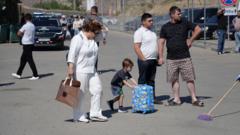The ongoing conflict, which began with Israeli strikes on Iranian sites on June 13, has reportedly resulted in significant casualties, with many citizens expressing their overwhelming fears and the pressing need to leave amidst the chaos that has made daily life unbearable.
The situation highlights the ongoing tensions in the region and the struggle of civilians caught in the crossfire.
The Agarak border crossing between Armenia and Iran has become a refuge for many Iranians fleeing the violent conflict that has erupted with Israel over the past eight days. The surrounding landscape of dry, rocky mountains and the intense heat create a stark environment for those escaping. Individuals traveling through the border are often carrying only the essentials, negotiating for transportation while recounting experiences of fear and instability in their homeland.
Among the travelers is a woman with a modern haircut cradling her baby, as her husband discusses fares with taxi drivers. Families from various backgrounds share their unease, revealing that many have connections to other countries, facilitating their flight. A father from Tabriz mentioned witnessing destruction firsthand: "All the people are scared, every place is dangerous, it's not normal," he relayed.
The recent conflict erupted after Israel launched military strikes against Iranian nuclear and military infrastructure, resulting in an estimated 657 casualties in Iran, according to the Human Rights Activists News Agency. As Iran retaliates, tensions have escalated, leading to heavy traffic as citizens flee Tehran, fearing for their lives in the wake of continuous sirens and explosions.
Many report treacherous journeys, with some driving for over twelve hours to reach safety. A young Afghan refugee described the relentless nighttime bombardments, stating, "It was very bad. People who have somewhere to go, they are leaving." Others, including vacationers from abroad, are now compelled to return home amid the chaos.
While some Iranian nationals at the border opted to return to their homeland despite the dangers, expressing a sense of loyalty and fearlessness in the face of threats, others underscore the Israeli regime's aggression and its implications for peace in the region.
The dynamic at the border illustrates the personal toll of international conflict, illustrating individual stories amidst a broader geopolitical crisis. The stark reality at the border is a testament to the urgent need for resolution in a region long plagued by hostilities.
The situation highlights the ongoing tensions in the region and the struggle of civilians caught in the crossfire.
The Agarak border crossing between Armenia and Iran has become a refuge for many Iranians fleeing the violent conflict that has erupted with Israel over the past eight days. The surrounding landscape of dry, rocky mountains and the intense heat create a stark environment for those escaping. Individuals traveling through the border are often carrying only the essentials, negotiating for transportation while recounting experiences of fear and instability in their homeland.
Among the travelers is a woman with a modern haircut cradling her baby, as her husband discusses fares with taxi drivers. Families from various backgrounds share their unease, revealing that many have connections to other countries, facilitating their flight. A father from Tabriz mentioned witnessing destruction firsthand: "All the people are scared, every place is dangerous, it's not normal," he relayed.
The recent conflict erupted after Israel launched military strikes against Iranian nuclear and military infrastructure, resulting in an estimated 657 casualties in Iran, according to the Human Rights Activists News Agency. As Iran retaliates, tensions have escalated, leading to heavy traffic as citizens flee Tehran, fearing for their lives in the wake of continuous sirens and explosions.
Many report treacherous journeys, with some driving for over twelve hours to reach safety. A young Afghan refugee described the relentless nighttime bombardments, stating, "It was very bad. People who have somewhere to go, they are leaving." Others, including vacationers from abroad, are now compelled to return home amid the chaos.
While some Iranian nationals at the border opted to return to their homeland despite the dangers, expressing a sense of loyalty and fearlessness in the face of threats, others underscore the Israeli regime's aggression and its implications for peace in the region.
The dynamic at the border illustrates the personal toll of international conflict, illustrating individual stories amidst a broader geopolitical crisis. The stark reality at the border is a testament to the urgent need for resolution in a region long plagued by hostilities.





















